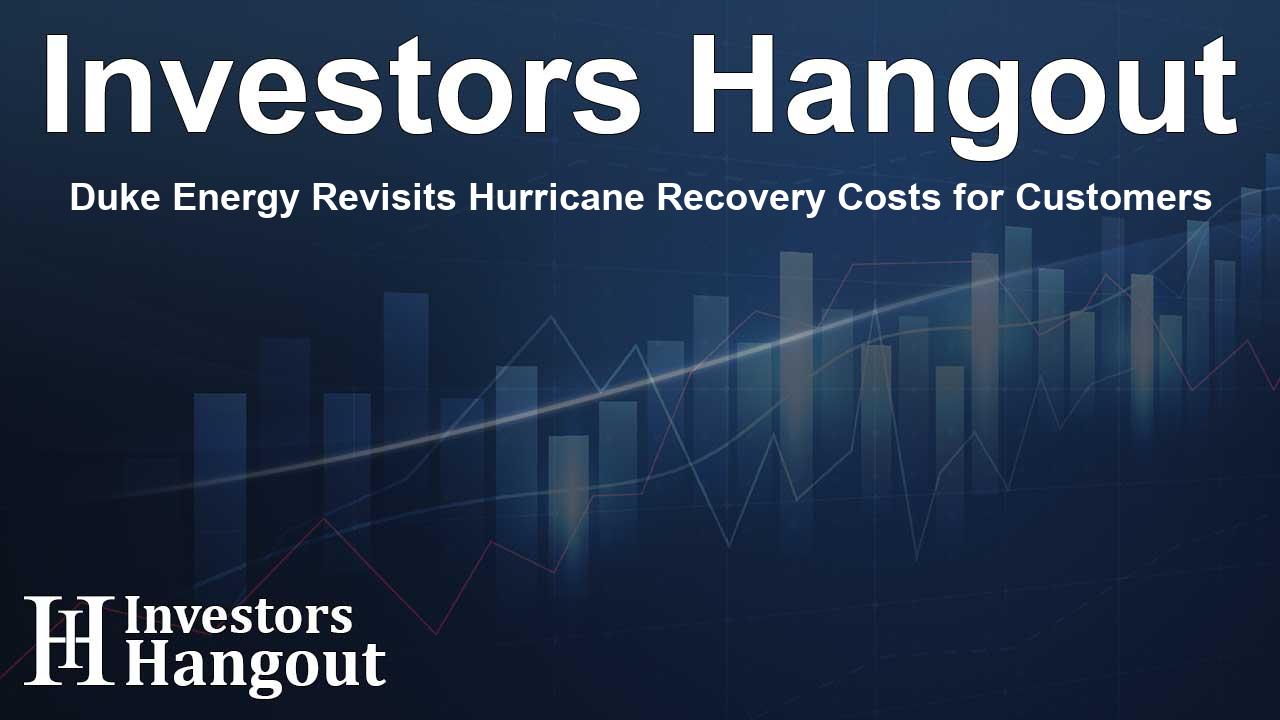Duke Energy Revisits Hurricane Recovery Costs for Customers

Duke Energy Florida Assesses Emergency Response Costs
In the aftermath of a challenging hurricane season, Duke Energy Florida is addressing the significant costs incurred during its emergency response operations. The company has filed a comprehensive recovery plan with the Florida Public Service Commission (FPSC) to recuperate approximately $1.1 billion in expenses tied to the activation and response following hurricanes Debby, Helene, and Milton. This restoration effort involved mobilizing over 27,000 workers to restore power for about 2 million affected customers.
Understanding the Implications of the Recent Hurricanes
The recent hurricanes have prompted a surge of action from Duke Energy Florida. The comprehensive filing details the wide-ranging costs incurred during the recovery efforts. Tasks included deploying numerous crews across vast service territories, acquiring mutual aid, and establishing staging sites and temporary lodgings for workers. Furthermore, the efforts also involved the feeding of lineworkers and essential repairs to critical infrastructure such as poles, wires, and transformers impacted by the storms.
Emergency Activation: What Was Done
According to Melissa Seixas, Duke Energy Florida's state president, the primary aim was to restore power efficiently and safely. "Our highest priority was to quickly reinstate electricity for our customers after the storms," she stated. The company's commitment focuses on minimizing the impact on customer bills while maintaining reliable service.
Analyzing the Hurricane Damage and Responses
The 2024 hurricane season was unprecedented, with Duke Energy Florida responding to three major storms in quick succession, including a Category 4 storm that severely tested their readiness:
Hurricane Debby (Category 1)
- Reported 350,000 outages.
- 3,000 personnel mobilized to assist.
- 320 damaged utility poles were replaced.
- 90% of outages were restored within 24 hours.
- 62,000 outages were automatically resolved by self-healing technology.
- 12.5 million minutes of outage time were saved.
Hurricane Helene (Category 4)
- 800,000 outages reported.
- 8,600 workers engaged in restoration efforts.
- 925 damaged poles were replaced.
- Most outages were restored within 72 hours, aside from the hardest-hit regions.
- 127,000 outages benefited from self-healing technology.
- 113 million minutes of outage time saved.
Hurricane Milton (Category 3)
- Over 1 million outages reported.
- 16,000 personnel mobilized for response efforts.
- 1,560 poles were repaired or replaced.
- 95% of outages were resolved within four days outside the most affected areas.
- 190,740 outages restored automatically through technology.
- A remarkable 200 million minutes of outage time were saved.
Temporary Billing Adjustments
As part of the cost recovery strategy, Duke Energy Florida anticipates a temporary increase on customer bills starting in the coming months. Residential customers should expect an adjustment of roughly $21 per 1,000 kilowatt-hours (kWh) compared to previous months. While the overall increase approximates $31, mitigation efforts have resulted in a $10 reduction due to seasonal variations.
Support for Affected Customers
Duke Energy Florida is committed to providing assistance through various financial programs aimed at supporting customers in distress. Guidance is accessible via the Customer Care number listed on bills or through the company’s official website. Programs include flexible billing options and the Share the Light initiative, which assists customers facing financial difficulties.
About Duke Energy Florida
Duke Energy Florida, a division of Duke Energy, provides electricity to 2 million customers across a sprawling service area. The company boasts 12,300 megawatts of energy capacity, emphasizing affordability, reliability, and innovation in its operations.
About Duke Energy
Duke Energy (NYSE: DUK), headquartered in Charlotte, N.C., stands among America's elite energy holding companies. The utility serves 8.4 million customers across several states, collectively owning a substantial 54,800 megawatts of energy capacity. With ongoing initiatives aimed at a clean energy transition, Duke Energy is addressing current energy demands while proactively investing in future resources and sustainability.
Frequently Asked Questions
What prompted Duke Energy Florida's recent filing?
Duke Energy Florida filed to recover costs associated with emergency responses following hurricanes Debby, Helene, and Milton, which caused extensive outages.
How many workers were mobilized during the storms?
Over 27,000 workers were mobilized to restore power during the recovery efforts after the hurricanes.
What will be the impact on customer bills?
Customers may see a temporary increase of approximately $21 per 1,000 kWh starting in March 2025 due to recovery costs.
What support does Duke Energy offer customers in need?
Duke Energy provides various assistance programs, including flexible billing and financial aid through the Share the Light Fund.
About Duke Energy's sustainability goals?
Duke Energy is working towards net-zero methane emissions by 2030 and aims for net-zero carbon emissions in electricity generation by 2050.
About Investors Hangout
Investors Hangout is a leading online stock forum for financial discussion and learning, offering a wide range of free tools and resources. It draws in traders of all levels, who exchange market knowledge, investigate trading tactics, and keep an eye on industry developments in real time. Featuring financial articles, stock message boards, quotes, charts, company profiles, and live news updates. Through cooperative learning and a wealth of informational resources, it helps users from novices creating their first portfolios to experts honing their techniques. Join Investors Hangout today: https://investorshangout.com/
Disclaimer: The content of this article is solely for general informational purposes only; it does not represent legal, financial, or investment advice. Investors Hangout does not offer financial advice; the author is not a licensed financial advisor. Consult a qualified advisor before making any financial or investment decisions based on this article. The author's interpretation of publicly available data shapes the opinions presented here; as a result, they should not be taken as advice to purchase, sell, or hold any securities mentioned or any other investments. The author does not guarantee the accuracy, completeness, or timeliness of any material, providing it "as is." Information and market conditions may change; past performance is not indicative of future outcomes. If any of the material offered here is inaccurate, please contact us for corrections.